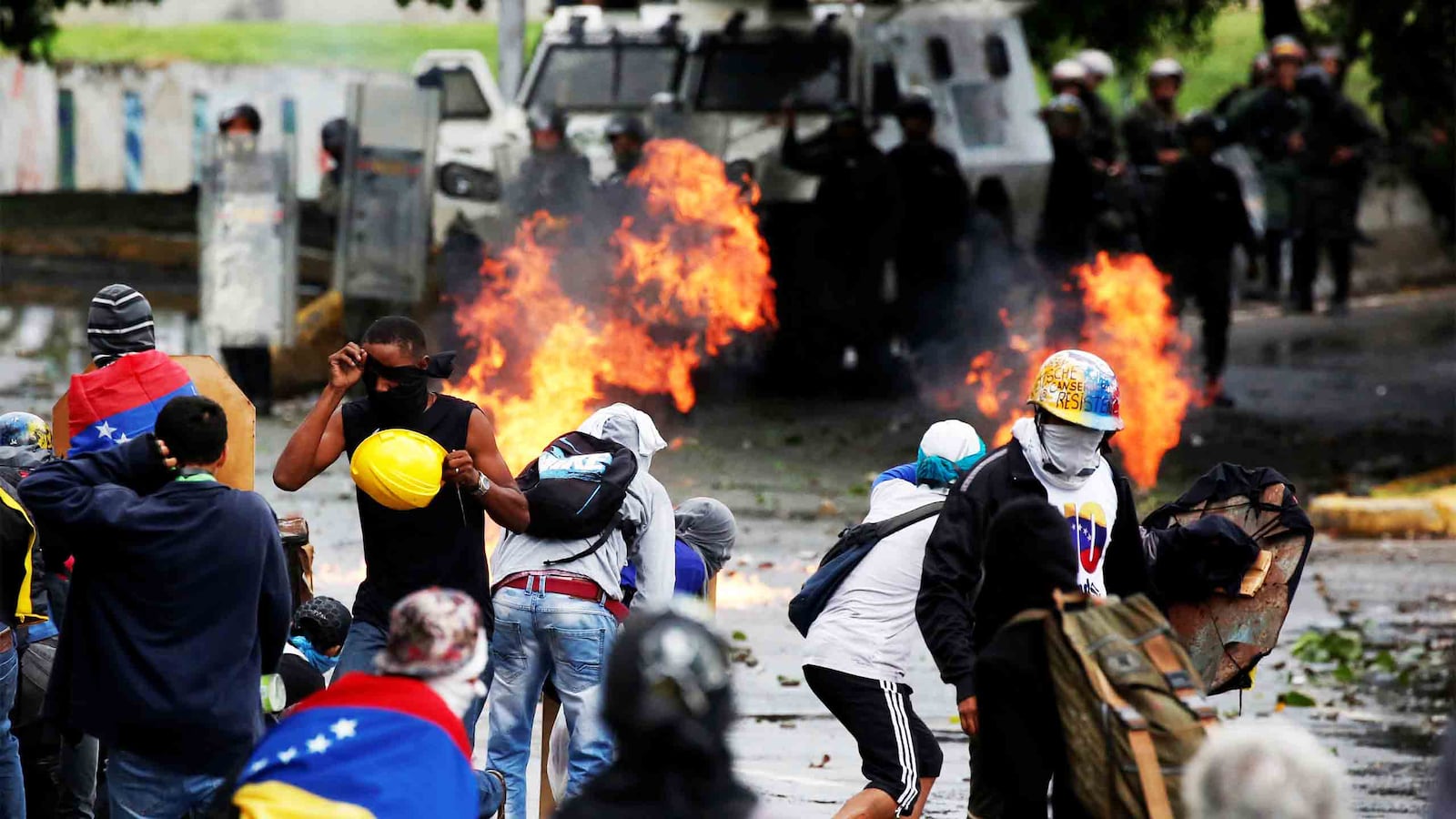CARACAS—On Sunday, the Venezuelan government expected citizens to vote in a highly controversial election that would see the country’s top legislative body, the national assembly, usurped by an all-powerful constitutional assembly.
But the government of President Nicolás Maduro wasn’t going to leave certain things to chance.
Earlier in the week, Maduro gave speeches urging government employees and employees at state-run companies to vote. And in a televised address on Saturday, the president said the government would be cross-checking lists of voters with lists of government employees to check who voted and who didn’t. Those who didn’t vote, Maduro said, would be fired by the following Monday.
During the leadup to the election, employees at state-run companies began anonymously reporting to media outlets that their superiors were intimidating them into voting on Sunday.
The Daily Beast confirmed the reports with two employees at state-run companies who were being pressured to participate in the election. One employee at a state-run bank said they were being told not only to go and vote but also to take cellphone pictures of their colleagues voting, to ensure everyone’s compliance.
Another said they were offered bread, a very valuable item in Venezuela these days, and when they signed their names on the list to get the bread, they were also asked where they would be voting and for whom they would cast their ballots.
Maduro also said that once the vote took place and members of the constitutional assembly were chosen on Sunday, the body would immediately begin to “govern” the country later this week. The president was one of the first to cast his ballot, voting at 6:05 a.m. on Sunday. The government strictly limited journalists’ freedom to cover the vote, however, setting up a 500-meter perimeter around each electoral station. The cushion helped ensure that journalists couldn’t take pictures that could potentially embarrass the government.
The few photos that did leak, however, out showed largely empty voting centers, and as initial projections for the total turnout began coming in, the day clearly looked like a major hit to the credibility of the vote.
In a country with 2.8 million state employees, early reports indicated only 2.2 million people turned out to vote. That number represents only 12 percent of registered voters and is a full 5 million less than the number of people who turned out to vote against the constituent assembly in plebiscite held earlier this month.
Late Sunday night, Venezuelan electoral authorities said that more than 8 million people had voted, while independent analysts and opposition leaders put the tally at between 2 million and 3 million, the Associated Press reported.
Internationally, the governments of Argentina, Colombia, Panama, and Peru said they would ignore the results, as did the U.S. ambassador to the United Nations, Nikki Haley, who said Sunday’s vote was a sham and a step toward dictatorship. Prior to the vote, the U.S. threatened new sanctions against Venezuela if it went ahead with the vote.
Some in Caracas had already been preparing for an apocalyptic scenario in the streets over the weekend by stockpiling food and water, and many are now terrified of what the vote will enable the government to do. At least two opposition politicians, Miguel Pizarro and Dr. José Manuel Olivares, told The Daily Beast that they felt it was possible the government would start arresting them and their colleagues.
Even regular civilians and at least one doctor in the city, Dr. Paul Maurette, who offers free surgeries to protesters, are so shaken by the events that they believe the country is already at civil war.
“I think there will be anarchy this weekend,” Maurette told The Daily Beast.
Aggressive government crackdowns on anyone gathering in the streets of Caracas prevented what had been expected to be massive protests against the impending election. The government’s harsh interventions ensured that no gatherings, no matter how small, could gain any traction.
The government also utilized some of its most potent forces, including the Directorate General of Military Counterintelligence (DGCIM), to quell dissent on the day of the vote. While national guardsmen and military troops with armored vehicles patrolled the highways, however, the protesters escalated the violence against the authorities significantly.
In downtown Altamira, a wealthy downtown district of Caracas, a remotely detonated IED exploded as a convoy of Venezuelan national guardsmen on motorbikes drove by the Canadian Embassy to disperse a crowd of protesters in downtown Caracas. The explosion left two guardsmen in flames, while others shot tear gas and rubber bullets at protesters and press gathered nearby. A paramedic at the scene told The Daily Beast that one protester had been shot in the back by a live round.
As of late Sunday night, reports of dead were still coming in, but it was believed that as many as 14 people had been killed in the previous 24 hours across the country, and with 26 dead in the last four days, the week marks the bloodiest period of the wave of protests that started in April. The overall death toll since April now stands at 128.
Many Venezuelans that spoke to The Daily Beast say that they’re not sure why they’re still in the country at this point, while others like Maurette, who has a license to practice in Europe, are only staying to help.
Maurette says it’s his moral duty as a doctor and as a citizen to aid the wounded; however he has already evacuated his wife and kids. The two children, 10 and 4 years old, will now have to live outside Venezuela for the first time in their lives.
“I see no future for them here anymore,” said Maurette, echoing the feelings of many in Caracas.





